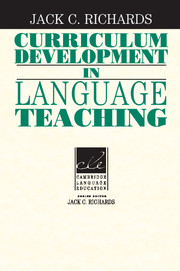Book contents
- Frontmatter
- Contents
- Series editor's preface
- Preface
- Credits
- 1 The origins of language curriculum development
- 2 From syllabus design to curriculum development
- 3 Needs analysis
- 4 Situation analysis
- 5 Planning goals and learning outcomes
- 6 Course planning and syllabus design
- 7 Providing for effective teaching
- 8 The role and design of instructional materials
- 9 Approaches to evaluation
- Author index
- Subject index
3 - Needs analysis
Published online by Cambridge University Press: 03 May 2010
- Frontmatter
- Contents
- Series editor's preface
- Preface
- Credits
- 1 The origins of language curriculum development
- 2 From syllabus design to curriculum development
- 3 Needs analysis
- 4 Situation analysis
- 5 Planning goals and learning outcomes
- 6 Course planning and syllabus design
- 7 Providing for effective teaching
- 8 The role and design of instructional materials
- 9 Approaches to evaluation
- Author index
- Subject index
Summary
One of the basic assumptions of curriculum development is that a sound educational program should be based on an analysis of learners' needs. Procedures used to collect information about learners' needs are known as needs analysis. Needs analysis as a distinct and necessary phase in planning educational programs emerged in the 1960s as part of the systems approach to curriculum development and was part of the prevalent philosophy of educational accountablity (Stufflebeam, McCormick, Brinkerhoff, and Nelson 1985). If providers of training programs wanted public or other sources of funding in order to provide different kinds of training programs, they were required to demonstrate that a proposed program was a response to a genuine need (Pratt 1980). Subsequently needs analysis developed into something of an industry. Berwick (1989, 51) comments:
The need for convincing precision in educational needs assessment was also reinforced during this period by the “behavioral objectives” movement in educational planning, particularly in North America, which insisted on specifying in measurable form all goals of importance within an educational system. The emphasis on precision and accountability clearly influenced the appearance of needs assessment as a form of educational technology and its diversification into a collection of educational research methodologies.
Needs analysis was introduced into language teaching through the ESP movement (see Chapter 2). From the 1960s, the demand for specialized language programs grew and applied linguists increasingly began to employ needs analysis procedures in language teaching. By the 1980s, in many parts of the world a “needs-based philosophy” emerged in language teaching, particularly in relation to ESP and vocationally oriented program design (Brindley 1984).
Information
- Type
- Chapter
- Information
- Curriculum Development in Language Teaching , pp. 51 - 89Publisher: Cambridge University PressPrint publication year: 2001
Accessibility standard: Unknown
Why this information is here
This section outlines the accessibility features of this content - including support for screen readers, full keyboard navigation and high-contrast display options. This may not be relevant for you.Accessibility Information
- 3
- Cited by
